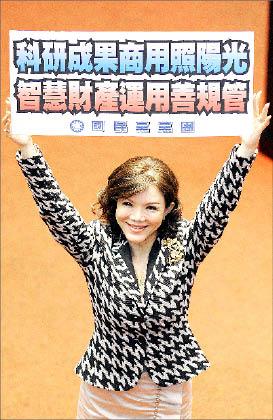The legislature yesterday eased regulations on the transfer of patented technology and the rules on participation by public-payroll researchers in the private sector amid calls to create a friendlier business environment in the ever-intensifying global battle for talent.
“The move will facilitate the return migration of professionals,” Academia Sinica president Wong Chi-huey (翁啟惠) said in response to the passage of the amendment to the Fundamental Act of Science and Technology (科學技術基本法).
The current law stipulates that intellectual property rights (IPR) on projects in the scientific and technological research and development areas subsidized, commissioned or funded by the government belong to the state and are subject to the National Property Act (國有財產法).

Photo: Fang Pin-chao, Taipei Times
Lawmakers agreed to exempt IPRs resulting from research projects at public schools, public research organizations and public enterprises from the National Property Act, meaning the act would not apply to those institutions with regards to the acquisition, management, utilization, disposition and revenue accrued from the rights.
National Science Council Deputy Minister Chen Cheng-hong (陳正宏) said the relaxation of the rule was designed to shorten the time required to transfer patents.
“Currently, the patent application process is a time-consuming process. It usually takes at least one year. By then, there is no market for the outdated technology,” Chen said.
The law was also amended to allow researchers at public schools at the junior level colleges and above, or at public institutions, to acquire more than a 10 percent stake in a company through investment of technology and to double as a member of a board of directors or a board of supervisors at a company.
Currently, researchers on the government payroll are subject to a 10 percent ceiling when acquiring a stake in a company and they are barred from taking up managerial positions in the private sector under the Act Governing the Employment of Educational Personnel (教育人員任用條例).
Chinese Nationalist Party (KMT) Legislator Nancy Chao (趙麗雲) said a statement issued by a group of academic, business and media leaders led by Wong in August urging the government to address a “brain drain” and recruitment difficulties had helped push through the amendment.
Chen said the amendment would help prevent incidents such as that involving Chen Yuan-tsong (陳垣崇), a top researcher credited with developing a drug to treat Pompe disease, who was once suspected of illegally profiting from the transfer and sale of patented technologies.
In June last year, Chen Yuan-tsong, then-director of Academia Sinica’s Institute of Biomedical Science, was charged with corruption over the transfer of drug technology to a company run by his wife.
Chen Yuan-tsong and Academia Sinica denied any wrongdoing. Prosecutors closed the case without indicting Chen Yuan-tsong.

Alain Robert, known as the "French Spider-Man," praised Alex Honnold as exceptionally well-prepared after the US climber completed a free solo ascent of Taipei 101 yesterday. Robert said Honnold's ascent of the 508m-tall skyscraper in just more than one-and-a-half hours without using safety ropes or equipment was a remarkable achievement. "This is my life," he said in an interview conducted in French, adding that he liked the feeling of being "on the edge of danger." The 63-year-old Frenchman climbed Taipei 101 using ropes in December 2004, taking about four hours to reach the top. On a one-to-10 scale of difficulty, Robert said Taipei 101

A preclearance service to facilitate entry for people traveling to select airports in Japan would be available from Thursday next week to Feb. 25 at Taiwan Taoyuan International Airport, Taoyuan International Airport Corp (TIAC) said on Tuesday. The service was first made available to Taiwanese travelers throughout the winter vacation of 2024 and during the Lunar New Year holiday. In addition to flights to the Japanese cities of Hakodate, Asahikawa, Akita, Sendai, Niigata, Okayama, Takamatsu, Kumamoto and Kagoshima, the service would be available to travelers to Kobe and Oita. The service can be accessed by passengers of 15 flight routes operated by

Taiwanese and US defense groups are collaborating to introduce deployable, semi-autonomous manufacturing systems for drones and components in a boost to the nation’s supply chain resilience. Taiwan’s G-Tech Optroelectronics Corp subsidiary GTOC and the US’ Aerkomm Inc on Friday announced an agreement with fellow US-based Firestorm Lab to adopt the latter’s xCell, a technology featuring 3D printers fitted in 6.1m container units. The systems enable aerial platforms and parts to be produced in high volumes from dispersed nodes capable of rapid redeployment, to minimize the risk of enemy strikes and to meet field requirements, they said. Firestorm chief technology officer Ian Muceus said

MORE FALL: An investigation into one of Xi’s key cronies, part of a broader ‘anti-corruption’ drive, indicates that he might have a deep distrust in the military, an expert said China’s latest military purge underscores systemic risks in its shift from collective leadership to sole rule under Chinese President Xi Jinping (習近平), and could disrupt its chain of command and military capabilities, a national security official said yesterday. If decisionmaking within the Chinese Communist Party has become “irrational” under one-man rule, the Taiwan Strait and the regional situation must be approached with extreme caution, given unforeseen risks, they added. The anonymous official made the remarks as China’s Central Military Commission Vice Chairman Zhang Youxia (張又俠) and Joint Staff Department Chief of Staff Liu Zhenli (劉振立) were reportedly being investigated for suspected “serious